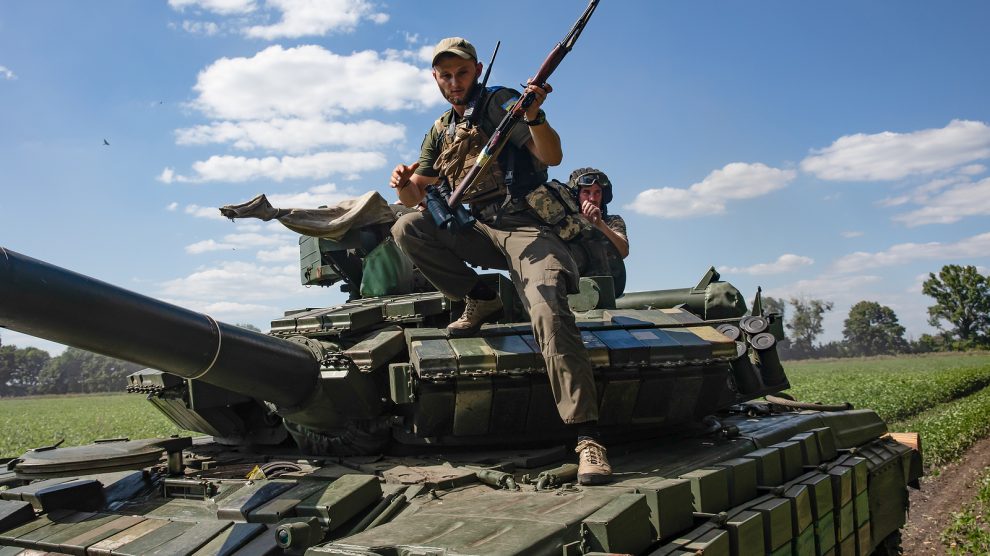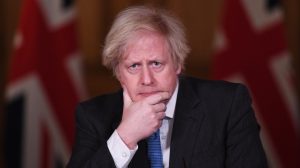A swift and successful Ukrainian counteroffensive has liberated large parts of the Kharkiv and Donetsk regions from Russian occupation. A complete Ukrainian victory now looks not just possible, but probable.
It took less than a week for Ukraine’s first major counteroffensive since the country was invaded by Russia in February to change, definitively it would appear, the course of the war.
According to the Institute for the Study of War, in just five days Ukraine’s armed forces recaptured more territory than Russia has taken since April, advancing more than 70 kilometres along a broad front east of Kharkiv, Ukraine’s second largest city.
Hundreds of settlements were liberated, including the strategically important town of Izyum, a Russian logistics hub.
- Time to reassess Ukraine’s macroeconomic strategy
- UN plan could make Zaporizhzhia nuclear power plant safe, but will need Russian support
- Digital, tax, and customs deals move Ukraine closer to EU
So fast was the Ukrainian advance that the retreating Russians were forced to leave behind vast amounts of equipment, all of which will be put to good use by a Ukrainian army that is still not receiving as many weapons as it needs from its western allies.
Its success over the past few days may serve to focus a few minds, however.
“It is now beyond doubt that Ukraine could have thrown Russia out months ago if they had been provided with the necessary equipment from day one,” says Gabrielius Landsbergis, foreign minister of one of Lithuania’s most staunch allies, Lithuania.
“If we had armed Ukraine faster, thousands of homes would have remained standing. Thousands of lives would have been saved. Thousands more children would now be safe with their parents. We must recognise the fact that appeasement did nothing to protect them.”
Landsbergis has proposed a five-point plan for the next phase of the war, including the disbursement to Ukraine of all stockpiles of western advanced armaments (ATACMS, tanks, fighter jets), the enforcement of safe zones around Ukraine’s nuclear power stations, and the immediate despatch of war crimes investigators to the newly liberated territories.
He also wants “clear red lines” to be drawn in order to deter Russian dictator Vladimir Putin from any “desperate last moves” and the “fast-track” integration of Ukraine into both NATO and the EU.
Peace would be good for Russia, too
Despite Ukraine’s stunning recent success on the battlefield, without the kind of support that Landsbergis advocates the war is from over. Nevertheless, it is not too soon to begin thinking about what peace terms will be asked of Russia, for it is now clear that eventually, Ukraine wins.
At the very least, peace would see Russia immediately withdraw all of its forces to within its internationally recognised borders. It would hand over all suspected war criminals, and it would agree to respect the sovereignty of Ukraine in perpetuity.
It would also agree to make reparation payments to support the cost of Ukraine’s reconstruction.
Once peace has been restored, economic sanctions against Russia should remain in place for a probation period of perhaps five years, after which they could gradually begin to be lifted as and when milestones of de-militarisation, democracy and the respect for human rights are reached.
These would include the release of all political prisoners, as well as free and fair parliamentary and presidential elections overseen by international observers from the Organisation for Security and Cooperation in Europe (OSCE).
Unthinkable not a week ago, that is now a peace that Russia might do well to consider else risk a humiliating total defeat.
It is a peace that would save countless lives, both Russian and Ukrainian. It is a peace that would offer Ukraine a chance to rebuild, as well as offer Russia itself the chance to change for the better.

The game has changed
Sadly, it is highly unlikely that the current totalitarian, terrorist regime in Moscow would countenance signing a formal peace deal that it would no doubt equate with surrender.
Russia is therefore likely to continue fighting in Ukraine for as long as possible, until its mutinous, poorly-trained, poorly-led and poorly-paid soldiers vote with their feet, or Ukraine – with requisite western support – manages to push it of the country.
What’s certain is that Russia will no longer be able to dictate the terms of any peace. Its goal of conquering all of Ukraine has been unachievable for months, since Ukraine repelled its initial onslaught. Now, what for Moscow would be the bare minimum – control of Crimea and Donbas and a veto over Ukraine’s NATO and EU membership – is also impossible.
In less than a week Ukraine’s armed forces have changed the game. It’s time to deliver whatever they need so that they can end it.
Unlike many news and information platforms, Emerging Europe is free to read, and always will be. There is no paywall here. We are independent, not affiliated with nor representing any political party or business organisation. We want the very best for emerging Europe, nothing more, nothing less. Your support will help us continue to spread the word about this amazing region.
You can contribute here. Thank you.







Add Comment